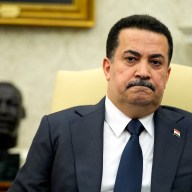MUNICH – Russia sees no need for an immediate response to U.S. overtures to improve relations, the deputy prime minister said Sunday after a meeting with Vice-President Joe Biden.
Russian Deputy Prime Minister Sergei Ivanov said Biden had “reaffirmed the strong intention of the U.S. to start anew,” which was “very positive” for Russia-U.S. relations.
“The U.S. administration sent a very strong signal, and the signal was heard – a signal that says they’re ready to resume the Russian and U.S. dialogue frankly and openly,” Ivanov told a news conference at the Munich Security Conference.
But he said Russia did not feel it necessary to immediately reciprocate, and he made no concessions after meeting with Biden about issues that have caused friction between Washington and Moscow in recent years.
“It is not an Oriental bazaar,” he said. “And we do not trade the way people do in the bazaars.”
Biden did not speak with reporters after the meeting.
Ivanov repeated Moscow’s standard line on several issues, such as its opposition to a proposed U.S. missile defence shield in Eastern Europe.
On Kyrgyzstan’s announcement last week that it would close the Manas airbase to the U.S. military, which had been using it to resupply troops in Afghanistan, Ivanov said Russia had not influenced the decision. He rejected suggestions by U.S. officials that Kyrgyzstan acted under pressure from Moscow after securing more than $2 billion in loans and aid from Russia.
“There is no correlation between the decision of the Kyrgyz Republic and loans that the Russian Federation granted to Kyrgyz republic,” Ivanov said, adding that closing the air base was “the decision of a sovereign state.”
On Georgia, Ivanov said Russia would continue to build “small bases” in the breakaway Georgian republics of South Ossetia and Abkhazia to prevent Georgia from attacking. He also defended Moscow’s recognition of the regions’ independence as “irrevocable.”
Last year, the U.S. had objected to Russia’s recognition of the regions after Russia and Georgia fought a brief war that devastated Georgia’s military.
U.S. relations with Russia were strained under president George W. Bush also by continuing NATO expansion eastward as well as Washington’s decision to base parts of a proposed missile shield in Poland and the Czech Republic.
President Barack Obama has not said if he would seek to proceed with the installations. He has said he supports missile defence in general, but wants to make sure the system is reliable and does not detract from other security priorities.
Ivanov repeated Moscow’s threat to place Iskander missiles in the Kaliningrad enclave if the anti-ballistic missile shield plans went ahead, and he again suggested such a system should be established jointly by the U.S. and Russia, using Russian radar.
“We have always said that the Iskanders … might be deployed in the Kaliningrad region in one case only: if the ABM system is deployed in Poland and the Czech Republic in the configuration that was designed by the last U.S. administration.”














